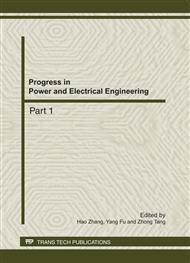p.943
p.947
p.953
p.959
p.964
p.968
p.974
p.978
p.983
Analysis of Performance of Several Types of Classical Controller in Automatic Generation Control for an Interconnected Power System
Abstract:
This paper presents automatic generation control (AGC) of interconnected two equal area power system provided with single reheat turbine and generation rate constraints of 3% per minute. This paper also contrasts to control performance of several types of classical controller, include of Integral (I), Proportional – Integral (PI), Integral – Derivative (ID), Proportional – Integral – Derivative (PID), or Integral – Double Derivative (IDD). With 1% step load perturbation in area1, controllers’ performance analysis can be taken by frequency deviation, tie-line power deviation, and input signal of governor.
Info:
Periodical:
Pages:
964-967
Citation:
Online since:
October 2011
Authors:
Keywords:
Price:
Сopyright:
© 2012 Trans Tech Publications Ltd. All Rights Reserved
Share:
Citation:


